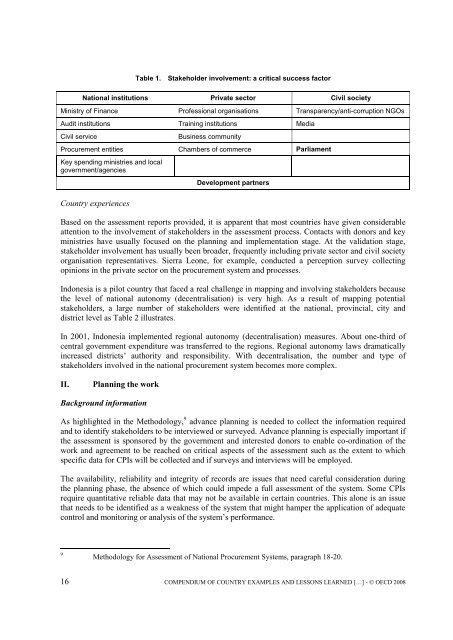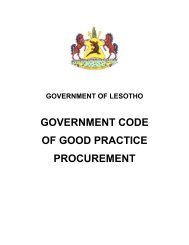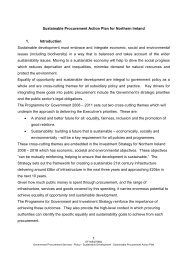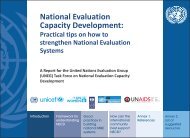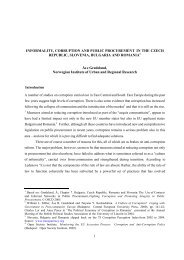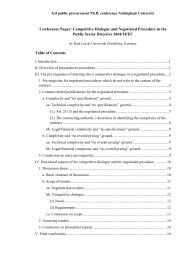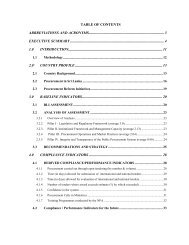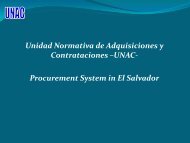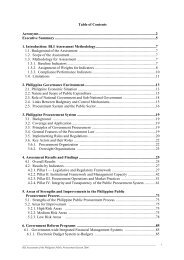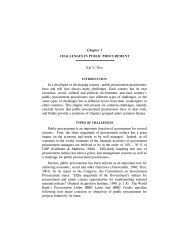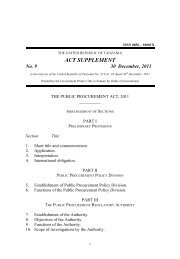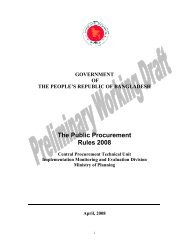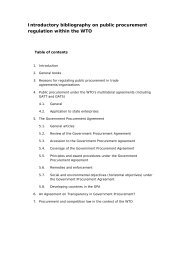Compendium of Country Examples and Lessons Learned from ...
Compendium of Country Examples and Lessons Learned from ...
Compendium of Country Examples and Lessons Learned from ...
You also want an ePaper? Increase the reach of your titles
YUMPU automatically turns print PDFs into web optimized ePapers that Google loves.
Table 1. Stakeholder involvement: a critical success factorNational institutions Private sector Civil societyMinistry <strong>of</strong> Finance Pr<strong>of</strong>essional organisations Transparency/anti-corruption NGOsAudit institutions Training institutions MediaCivil serviceBusiness communityProcurement entities Chambers <strong>of</strong> commerce ParliamentKey spending ministries <strong>and</strong> localgovernment/agencies<strong>Country</strong> experiencesDevelopment partnersBased on the assessment reports provided, it is apparent that most countries have given considerableattention to the involvement <strong>of</strong> stakeholders in the assessment process. Contacts with donors <strong>and</strong> keyministries have usually focused on the planning <strong>and</strong> implementation stage. At the validation stage,stakeholder involvement has usually been broader, frequently including private sector <strong>and</strong> civil societyorganisation representatives. Sierra Leone, for example, conducted a perception survey collectingopinions in the private sector on the procurement system <strong>and</strong> processes.Indonesia is a pilot country that faced a real challenge in mapping <strong>and</strong> involving stakeholders becausethe level <strong>of</strong> national autonomy (decentralisation) is very high. As a result <strong>of</strong> mapping potentialstakeholders, a large number <strong>of</strong> stakeholders were identified at the national, provincial, city <strong>and</strong>district level as Table 2 illustrates.In 2001, Indonesia implemented regional autonomy (decentralisation) measures. About one-third <strong>of</strong>central government expenditure was transferred to the regions. Regional autonomy laws dramaticallyincreased districts‟ authority <strong>and</strong> responsibility. With decentralisation, the number <strong>and</strong> type <strong>of</strong>stakeholders involved in the national procurement system becomes more complex.II.Planning the workBackground informationAs highlighted in the Methodology, 9 advance planning is needed to collect the information required<strong>and</strong> to identify stakeholders to be interviewed or surveyed. Advance planning is especially important ifthe assessment is sponsored by the government <strong>and</strong> interested donors to enable co-ordination <strong>of</strong> thework <strong>and</strong> agreement to be reached on critical aspects <strong>of</strong> the assessment such as the extent to whichspecific data for CPIs will be collected <strong>and</strong> if surveys <strong>and</strong> interviews will be employed.The availability, reliability <strong>and</strong> integrity <strong>of</strong> records are issues that need careful consideration duringthe planning phase, the absence <strong>of</strong> which could impede a full assessment <strong>of</strong> the system. Some CPIsrequire quantitative reliable data that may not be available in certain countries. This alone is an issuethat needs to be identified as a weakness <strong>of</strong> the system that might hamper the application <strong>of</strong> adequatecontrol <strong>and</strong> monitoring or analysis <strong>of</strong> the system‟s performance.9Methodology for Assessment <strong>of</strong> National Procurement Systems, paragraph 18-20.16 COMPENDIUM OF COUNTRY EXAMPLES AND LESSONS LEARNED […] - OECD 2008


